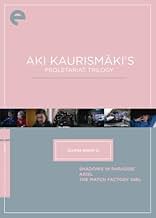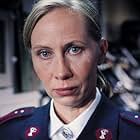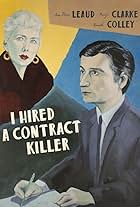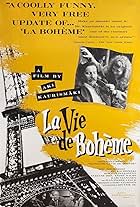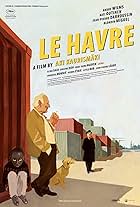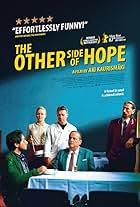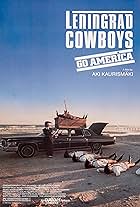IMDb RATING
7.5/10
13K
YOUR RATING
A woman's terribly dull life is upended by a one-night stand pregnancy, causing her to seek retribution.A woman's terribly dull life is upended by a one-night stand pregnancy, causing her to seek retribution.A woman's terribly dull life is upended by a one-night stand pregnancy, causing her to seek retribution.
- Awards
- 6 wins & 5 nominations total
Helka Viljanen
- Office Employee
- (as Helga Viljanen)
Unknown Tank Man
- Self
- (archive footage)
- (uncredited)
- Director
- Writer
- All cast & crew
- Production, box office & more at IMDbPro
Featured reviews
Matches here are a metaphor for undistinguished short lives, and work well to propel Aki Kaurismaki's sere, reductionist story. He clearly works well with lead actress Kati Outinen, and the predictability of the tale is deliberate so as to force the viewer to confront the unsaturated colors, the paint that needs re-doing, the absence of empathy, the rarity of anything in the lead character's life to cling to or believe in. While themes, aesthetics and behaviors on display here are characteristically Nordic, Kaurismaki's manner, set-ups, and potent understatement are his alone and in top-shelf form. One wants a larger oeuvre from him.
Iris is a young Finnish girl whose life has no horizon. She works in a match factory and still lives at her parents'. She escapes by reading soppy love stories or by attending a dance. One night, she thinks she has found Prince Charming. But the latter reveals himself a scornful human being who has no consideration for her. Then, she is chased away by her parents and relies on her brother's generosity to put her up. But Iris didn't say her last word and she decides to prepare a plan to have a revenge on the ones who couldn't love her.
In the nineteenth Century, Andersen, a Danish writer wrote a tale entitled "the little match girl". Here, the film-maker Aki Kaurismäki kept certain elements of this tale to create in his own way, a sort of updated version. And it's a much more austere one so much that it virtually evokes Robert Bresson's cinema. This is how I perceive "the Match Factory Girl" (1990): a cross between a modernized version of Andersen's tale and Bresson's cinema for the straight-forward style and the intense austerity in which the story bathes.
Aki Kaurismäki seems to have understood that to give his movie a big dramatic intensity, ostentation and exaggeration were to be excluded. The amount? A grievous movie which hurts where everything in the cinema writing is reduced to simplicity, nearly stillness and despair. This, to better express the dreary world in which Iris is prisoner and the wrong hopes she comes up against. Barely camera movements (the movie nearly looks like a succession of paintings), sinister scenery, blue-green lighting, dumb or merciless characters blend themselves to create a universe impenetrable to happiness. To plunge more in this desolate world, Kaurismäki nearly shot a silent movie, only scattered by laconic and reduced in the extreme dialogs. But to tell the truth, dialogs are not the most important thing. Looks matter more and reveal best the characters' thoughts and feelings.
The director's sympathy towards Iris and making her put up at her brother's are the only pities he shows and his movie would be of a total blackness if there wasn't humor. A humor which acts in an ironic way: "I came to tell you goodbye...".
Overrall, this grave movie about the lack of love strikes right at the heart and its vision is rather difficult. If you are down in the dumps, save it for a better day. It's a short movie (hardly an hour) but Iris' pale and retiring countenance stays rooted for a long time in the spectator's brain. And Kati Outinen, impressive of fragility and sensitiveness is perfect in this role.
In the nineteenth Century, Andersen, a Danish writer wrote a tale entitled "the little match girl". Here, the film-maker Aki Kaurismäki kept certain elements of this tale to create in his own way, a sort of updated version. And it's a much more austere one so much that it virtually evokes Robert Bresson's cinema. This is how I perceive "the Match Factory Girl" (1990): a cross between a modernized version of Andersen's tale and Bresson's cinema for the straight-forward style and the intense austerity in which the story bathes.
Aki Kaurismäki seems to have understood that to give his movie a big dramatic intensity, ostentation and exaggeration were to be excluded. The amount? A grievous movie which hurts where everything in the cinema writing is reduced to simplicity, nearly stillness and despair. This, to better express the dreary world in which Iris is prisoner and the wrong hopes she comes up against. Barely camera movements (the movie nearly looks like a succession of paintings), sinister scenery, blue-green lighting, dumb or merciless characters blend themselves to create a universe impenetrable to happiness. To plunge more in this desolate world, Kaurismäki nearly shot a silent movie, only scattered by laconic and reduced in the extreme dialogs. But to tell the truth, dialogs are not the most important thing. Looks matter more and reveal best the characters' thoughts and feelings.
The director's sympathy towards Iris and making her put up at her brother's are the only pities he shows and his movie would be of a total blackness if there wasn't humor. A humor which acts in an ironic way: "I came to tell you goodbye...".
Overrall, this grave movie about the lack of love strikes right at the heart and its vision is rather difficult. If you are down in the dumps, save it for a better day. It's a short movie (hardly an hour) but Iris' pale and retiring countenance stays rooted for a long time in the spectator's brain. And Kati Outinen, impressive of fragility and sensitiveness is perfect in this role.
With THE MATCH FACTORY GIRL Kaurismaki might not tread new ground but instead perfects the stylistic hallmarks that marked him apart from most other directors of his generation. His work is that of a sculptor, hacking away at all the cinematic fat, shaping form by removing that which is not necessary. His movies as an extension of his sculptory approach attain an almost hypnotic quality - or perhaps boring uneventfulness for others. He's not at all trying to hit emotionally draining highs and lows but build a rhythmic lull, a soothing pace created of flows and ebbs that move with imperceptible change. As a result, his movies never hurry to get anywhere fast and when they get there not a whole lot happens. It's all about appreciating how they got there and the stylistic subtleties of that journey.
THE MATCH FACTORY GIRL finds Kaurismaki shunning dialogue even more than previous efforts, if that's even possible without making a modern silent picture. Which it pretty much is. The entirety of the dialogue doesn't amount to more than 1 minute and that too is used more as a form of punctuation to the images - he could easily have done the movie completely without dialogues if he so wanted. The story could have been summed up in a 20 minute short yet Kaurismaki stretches it to 65 minutes, a meagre duration by most people's standards, which here feels like a good 90 minutes.
Although the material is perhaps the most bleak and brooding he had done at that point in his career since his debut CRIME AND PUNISHMENT, it is spiced up by moments of his trademark glacial humour. A certain scene in bar involving a drunk, sleazy patron and rat poison had me laughing out loud, which is a minor success for a film of this kind. The most dramatic scenes are delivered with that same kind of deadpan unaffection that immediately acquires a serio-comic air for that reason.
Although it lacks the playfulness of its predecessor (ARIEL), this is still Kaurismaki in top visual form. He has a way with images and how he orchestrates them that is quite unparalleled at his level. Sure he's not a director of epic works and spectacle but he's carved a niche for himself over the years that has his name and particular sensibilities written all over it and he's been content to work within it. If you like his style, this is a safebet. If you're a newcomer I'd suggest starting with something like ARIEL.
THE MATCH FACTORY GIRL finds Kaurismaki shunning dialogue even more than previous efforts, if that's even possible without making a modern silent picture. Which it pretty much is. The entirety of the dialogue doesn't amount to more than 1 minute and that too is used more as a form of punctuation to the images - he could easily have done the movie completely without dialogues if he so wanted. The story could have been summed up in a 20 minute short yet Kaurismaki stretches it to 65 minutes, a meagre duration by most people's standards, which here feels like a good 90 minutes.
Although the material is perhaps the most bleak and brooding he had done at that point in his career since his debut CRIME AND PUNISHMENT, it is spiced up by moments of his trademark glacial humour. A certain scene in bar involving a drunk, sleazy patron and rat poison had me laughing out loud, which is a minor success for a film of this kind. The most dramatic scenes are delivered with that same kind of deadpan unaffection that immediately acquires a serio-comic air for that reason.
Although it lacks the playfulness of its predecessor (ARIEL), this is still Kaurismaki in top visual form. He has a way with images and how he orchestrates them that is quite unparalleled at his level. Sure he's not a director of epic works and spectacle but he's carved a niche for himself over the years that has his name and particular sensibilities written all over it and he's been content to work within it. If you like his style, this is a safebet. If you're a newcomer I'd suggest starting with something like ARIEL.
Kaurismaki is nothing if not an efficient director. The stylistic elements of 'The Match Factory Girl' are distilled, like the vodka that is drunk throughout, to produce an intense and disturbing effect. Much of the action goes on outside the characteristically static camera frame, and Kati Outinen's deadpan face conveys a correspondingly broad range of expressions (she is excellent at signalling imminent vomiting without appearing to twitch a muscle). It's a film that moves on and out with the minimum of movement and dialogue, and its downwards pull is mesmerising. It's also bitterly funny. Late in the film the main character, Iris, approaches the shop counter and asks for a bottle of rat poison, to which the reply is: 'Small or large?'
I was fairly low when I saw this film. I came out feeling marvellous. Another triumph for the relief to be found in misery, a paradox which Kaurismaki cheerfully exploits in his dark, tragic & hilarious films.
I was fairly low when I saw this film. I came out feeling marvellous. Another triumph for the relief to be found in misery, a paradox which Kaurismaki cheerfully exploits in his dark, tragic & hilarious films.
Yesterday I watched this film straight after Kaurismaki's film of the same year 'I Hired a Contract Killer', and this struck me as a far superior film, possibly because I'd prefer to see drab Finnish locations than (the usual) drab British locations and maybe also because of the annoying poor acting from Jean-Pierre Leaud's female co-star (my Finnish friend asked me why the women sounded like a 'learn the English language' tape). Overall the film seemed to be a generally better piece of cinema than 'Contract Killer'.'The Match Factory Girl' is a continuation of Kaurismaki's trade-mark minimal style (and also content)in which a young (match-factory working) girl leads a depressingly sad life in which she is used and abused by everyone around. Kaurismaki's films (to me at least) can be described as deadpan Bergman in silence, and yesterday i heard that Aki grew up with autism, this is partly the reason of the lack of communication between characters and also the low amount of dialogue. The film is not as depressing as sounds though, and is lifted by Kaurismaki's use of deadpan humour. For any Kaurismaki (add to this Jarmusch and Kitano)fan, this film will not disappoint, although it is pretty difficult to track down.
Did you know
- TriviaThe third installment of Aki Kaurismäki's Proletariat Trilogy, after "Varjoja paratiisissa" (Shadows in Paradise (1986)) and Ariel (1988). Over 30 years later, "Kuolleet lehdet" (Fallen Leaves (2023)) became the fourth one in the "trilogy."
- ConnectionsFeatured in Century of Cinema: Scandinavie, Stig Björkman (1995)
Details
Box office
- Gross worldwide
- $701
- Runtime1 hour 9 minutes
- Sound mix
- Aspect ratio
- 1.85 : 1
Contribute to this page
Suggest an edit or add missing content

Top Gap
By what name was The Match Factory Girl (1990) officially released in India in English?
Answer





